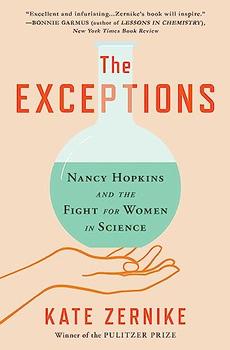Summary | Excerpt | Reading Guide | Reviews | Beyond the Book | Readalikes | Genres & Themes | Author Bio

Nancy Hopkins, MIT, and the Fight for Women in Science
by Kate Zernike
Bunting, known since childhood as Polly, quickly saw that Radcliffe women could not help but feel like second-class citizens. Life in their dormitories was "detached and thin" compared to Harvard's house system, with its live-in tutors, guest speakers, and bounty of student activities. Bunting began publicly decrying what she called the "climate of unexpectation" for American girls, steered away from education and into early marriage by "hidden dissuaders," "the inherited influences, the cultural standards which produce, for example, the belief that a scientific career is somehow 'unladylike' or that marriage should be enough of a career for any woman." Among the high school students scoring in the top 10 percent on ability tests, 97 percent of those who didn't go on to college were girls. Those who did go on, she argued, were squandered by a society that did not embrace their accomplishment or potential. The women of America—emancipated, educated, and enfranchised—were a "prodigious national extravagance." While it was no longer unusual for women to desire and obtain college degrees, "we have never really expected women to use their talents and education to make significant intellectual or social advances," Bunting wrote in the New York Times Magazine in 1961. "We were willing to open the doors but we did not think it important that they enter the promised land."
Bunting had been thinking about these ideas well ahead of Betty Friedan, whose bestselling book, The Feminine Mystique, had been published in February 1963, two months before Nancy took her place in Watson's lecture hall. Friedan's book raged against a culture that had locked intelligent and well-educated women into lives of "quiet desperation"—kept from full participation and their full potential—by convincing them there was fulfillment in polite children, passive sex, and a perfectly waxed kitchen floor. Friedan had asked Bunting to collaborate on the book, and Bunting had met with her several times but soon concluded that Friedan was too angry, too intent on blaming men for women's problems.
Bunting didn't blame men. She thought the limits on women hurt everyone, as she wrote in the Times Magazine: "A dissatisfied woman is seldom either a good wife or a good mother."
And she didn't think women necessarily had to have careers. In fact, she suggested they work on the fringes, "where there is always room," rather than compete directly against men. She urged her undergraduates to marry and have children and also to find "something awfully interesting that you want to work on awfully hard." Having children would be a pause, not the termination, of intellectual pursuits outside the home. She envisioned the successful path of work and family ambitions like the new interstate highway system connecting postwar America, with women finding on- and off-ramps along the way.
She faulted previous generations of educated women for encouraging a negative stereotype of smart women: "For the most part, they became crusaders and reformers, passionate, fearless, articulate, but at times, loud," she wrote in her annual president's report in 1961. "Today, several generations later, the bitter battles for women's rights are history. The cause has been won. The stereotype has disappeared and with it, the hard prejudice. But not altogether. For there is still prevalent a form of anti-intellectualism which insists that whatever her aspirations, a woman must eventually choose between career and marriage, and that if she attempts to combine the two, both will suffer and the marriage probably the more keenly."
Bunting was fifty when she became president of Radcliffe, and saw her presidency as a perch from which to promote a happier image of a life that combined family and professional pursuits. She herself had raised four children and four goats, served on school and library boards, and grown all her own vegetables in between part-time positions at Bennington and at Yale, where her husband had been on the medical faculty. She had carried on despite adversity, taking on the job as dean of Douglass College, the women's branch of Rutgers, after she was widowed at forty-four. And she saw Radcliffe as "a promising instrument for the attack that is called for." As some trustees urged a merger with Harvard, she argued that it was a "negation of fact" to assume that women and men should be educated the same way. Women needed the same rigorous coursework as Harvard men, but their futures were in many ways more complicated, and they needed help planning "wisely and largely" so they would not lose their way. Bunting started what she called a "campaign versus apathy" that included a lecture series around Radcliffe Yard, thesis presentations with professors, but also "living room talks" of how to be a mother and wife.
Excerpted from The Exceptions by Kate Zernike. Copyright © 2023 by Kate Zernike. Excerpted by permission of Scribner. All rights reserved. No part of this excerpt may be reproduced or reprinted without permission in writing from the publisher.
A book may be compared to your neighbor...
Click Here to find out who said this, as well as discovering other famous literary quotes!
Your guide toexceptional books
BookBrowse seeks out and recommends the best in contemporary fiction and nonfiction—books that not only engage and entertain but also deepen our understanding of ourselves and the world around us.